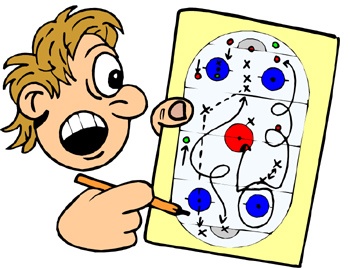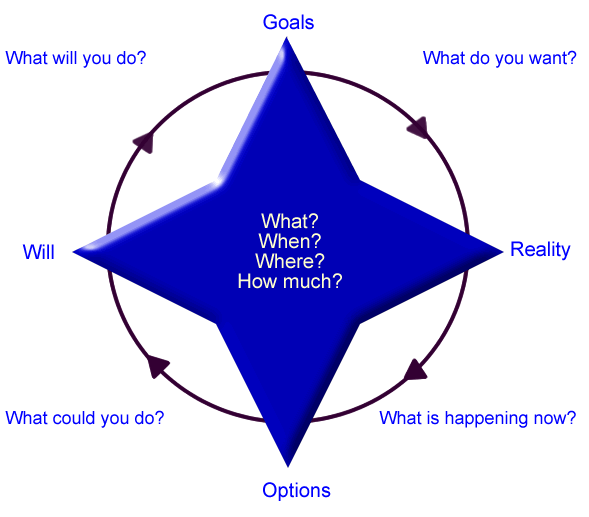Can you explain me what made you decide to appeal to a
coach?
a. At the start, most of the time a coachee will only reveal a
part of his actual situation. Don’t jump on to the first
issue named, but explore his situation more profoundly.
b. If coachees provide incomplete or vague information, be
careful not to complete the data with your own
interpretations or guesses. Better is: paraphrase,
summarize, ask for more clarification. E.g.: “If I
understand you correctly …”, or: “Let’s return to what
you just said ….”, or: “can you tell me what exactly you
mean by …”
107
4. Explore emotions:
a. “I wonder how you feel about this?”
b. “And how does this make you feel?”
c. “How is all this affecting you?”
d. “What does this mean for you?”
e. “How do you cope with this situation?”
f. “What will you gain by reaching / not reaching your
goal?”
g. “How will it feel to succeed?”
h. “How does this fit with your way of life? - values? -
plans? …”
i. “Which concrete doubts / fears do you have regarding …”
5. Identify problems: The aim here is to prioritize: which
problems are more important and urgent to the coachee?
What will we focus on first?
a. Summarize: “We have discussed a number of issues…” +
name them!
Then ask: “Which issue is most important to you at this
moment?”
b. Haven you been in a situation similar to the one you are
in now earlier in life?
How did you solve the problem that time?
c. What other circumstances affect you with regard to this
matter? Would you like to have a closer look at these
circumstances?
d. What is the first target you would like to work toward?
e. What are you afraid of?
6. Explore the problem in more detail
a.
“Why exactly are you seeing this as the most important
issue?”
b.
“Can you tell me more about…”
c.
“Which obstacles keep you from solving this problem?”
108
7. Explore possible goals:
a.
“I wonder if you already considered …”
b.
“Do you feel inspired when you think about this goal?”
c.
“Is this what you really want – ad not a dream you like
to cherish?”
d.
“Is this what you really want- or are you settling for
something less?”
e.
“How do you see this situation evolve in the future?”
f.
“Which changes will indicate that you are on the right
path toward your goal?”
g.
“Imagine that X would happen, how would this impact
the situation?”
h.
“Imagine that the problem was solved, what exactly
would be different?”
i.
“How do you think this could help?”
8. Identify goals:
a.
“What do you hope to achieve in this field?”
b.
“Which goal will you start with?” - “What is your
goal?”
c.
“Is you goal stated in the positive?”
d.
“Is this a smart goal? – is it clearly stated? - not too big,
nor too small?”
e.
“Is this goal largely within your competence and
control?”
f.
“What would success in this field look like to you?”
g.
“What would be indicators that you are having
problems in this area?”
h.
“How can I help you to avoid these problems?”
i.
“How would you like to be coached?”
j.
“Are there clear defining moments when you will know
that you are proceeding towards your goal?”
k.
“What would you like to have achieved one year from
now? Two years from now? Five years from now?”
l.
“How will you know when you reached your goal?”
109
m. “What will be the positive results of these changes?”
n.
“What will you lose if you do / do not get this goal?”
o.
“When do you want this to happen?”
p.
“Is this really what you want?”
q.
“Does your goal conflict with any other goals or
aspirations you have?”
r.
“What exactly do you want to get out of this …
(conversation)?”
9. Explore resources:
a.
“What do you need to reach this goal?”
b.
“How would you have to change to achieve your goal? –
what is preventing you to change?”
c.
“Which things in your personal environment would you
have to change to achieve your goal?”
d.
“Are there any specific skills that you would want to
develop and how can I help you with that?”
e.
“How can ……… help you achieve your target?”
f.
“What does the term “inner resources” mean to you?”
g.
“Who or what can help you to get what you want?”
h.
“What resources do you already have; what other
resources do you need?”
i.
“What prevented you from reaching this goal?”
j.
“Are other people obstructing you? How? Why?”
k.
“What else might get in the way?” (Obstacles can be
found in yourself, others, the physical environment or a
lack of resources.)
l.
“Who might be willing – and able – to support you? –
how and when are you going to get that support?
10. Explore obstacles: take each obstacle in turn and apply the
questions below:
a.
“What would be your first step to get around this
obstacle?”
b.
“What is the simplest solution?”
110
c.
“If you had no limitations, what would you do?”
d.
“What is the perfect solution?”
e.
“How can you lend / create / trade …. What you need?”
f.
“How can you learn the skills that you need?”
g.
“Who would you ask for information, knowledge or help
that you need?”
h.
“What are you already doing now that works in terms of
getting your goal?”
i.
“Have you, or others you know, dealt with something
like this in the past? – What did you do then? “
j.
“How can you find a tried and tested y around the
obstacle?”
k.
“What would you do if you were more / less assertive /
smart / healthy / rich?”
l.
“What would be a real risk that you would be willing /
unwilling to take?”
m. “Do you need to solve this obstacle at all or can you just
avoid the negative consequences – or find a partial
solution that would work for the moment?”
11. Explore options:
a.
“How would you like to go about this matter?”
b.
“What could you do to prepare yourself for this
challenge?”
c.
“How can ……… help you achieve your target?”
d.
“What will be the next step?”
e.
“How can you start to make things change?”
f.
“What will happen then?”
g.
“If somebody else was in your shoes – what would you
tell them?”
h.
“What further options are open to you?”
i.
“If you had an unlimited amount of time and money,
what would you do?”
j.
“If you knew you could not fail, what would you do?”
111
k.
“What would a total novice in the field do in the same
situation?”
l.
“What would George Clooney / Einstein / Someone with
a strong sense of self… do?”
m. “What does your gut-feeling / intuition tell you?”
n.
“What are the barriers to changing?”
“What are some things that can help you to overcome
these barriers?
12. Redact an action plan: convert options into actions.
a.
“What is your plan?”
b.
“What would be a good step in the right direction?”
c.
“What works? / What has worked before? – Can you
reinforce that? – do it again?”
d.
“What more can be done?”
e.
“Which things could be done if YOU did not have to do
them?”
f.
“What do you (first) need to do in order to move
forward?
g.
Boomerang Question
Redirect a question back to the learner
Example: “That’s a good question. What do you
think ought to be done in that situation?”
Take each option in turn and ask the following questons:
h.
“What is the first action step you need to take?”
i.
“If you are not certain about which step to take first:
Do you know other necessary steps?”
j.
“How can you work forward from my first action the
next youI must take?”
k.
“Do you need to
1.
“Make a contact?”
2.
“Acquire a new skill?”
3.
“Gain specific knowledge?”
112
4.
“Take action to change a pattern?”
5.
“Remind myself on my goal and process?”
6.
“Do something physical?”
7.
“Complete something?”
8.
“Ask for something?”
9.
“Offer something?”
l.
“Have you considered all the options that might be
useful?”
m.
“Have you built in ways to stay motivated?”
n.
“What would be a creative / bold / adventurous action
for you?”
o.
“How could you take action on your biggest
challenge?”
113

114
1.7.4 A TYPICAL LIFE COACHING SESSION
Because the life coaching relationship is unique, it helps to know
the most productive things to talk about with your life coach
during your call or meeting - and what not to talk about!
A typical life coaching session will cover:
How you are
What has happened since the previous coaching session
What you are working on
How your life coach can help you
What is next
How you are:
How you are feeling about yourself - the good, the bad and
the ugly!
How you are looking at your life - changing perception and
greater awareness
How you are feeling about others
What has happened since the previous coaching session:
What has occurred to you since the last session
Breakthroughs, successes, insights
Any new choices and decisions made
Personal news
What you are working on:
Progress report on your goals, projects and activities
What you've done that you are proud of - achievements
What you are coming up against - challenges and setbacks
115

How your life coach can help you with:
Something you are having difficulty making progress
with
A challenge you are not sure/confident about
A plan of action
Brainstorming for a solution
A new strategy or some guidance
What is next:
The next goal or project to take on
What you want next for yourself
Challenges that are more stretching
New opportunities you would like to pursue
Source:
http://www.lifecoachingedinburgh.co.uk/coachingsessions.htm
116
2 / Models for Coaching
There are more models for coaching than just the “Grow” model.
By this statement, I do not want to diminish the merits of
“Grow”. “Grow” is perfect as a starting model. In fact, for many
coaches it will always remain their favourite approach to
coaching. You too may find yourself returning to it often
because of its versatility, clear structure and thoroughness. In
addition, “Grow” is a model, which allows for self-coaching as it
does not necessarily require the presence of a coach.
However, with times many scores of models have been
developed. Some of them certainly also have their merits.
Knowing about them allows you to vary your approach and add
more possibilities to your coaching style, which will better your
chances of success. In fact, a many models approach is probably
your best bet to lead people towards finding the best solution
possible.
A warning is in place though: A model is a framework,. Just like
a map is not the road, the model is not the coaching. Some
people develop a model and then commercialize it, asking
money from whoever works with their model. Personally I
would advise against spending money just for using a model.
Although, by the time you finished studying the present chapter,
you will understand the importance of a good model., you will
also understand that there is no such thing as a miracle-model.
In the end, the best coach is not the one with most techniques in
his sleeve. In fact, using too many techniques may even reflect
negatively on the coaching process. Bruce Lee once said: "I
would rather have ten techniques that work for me than one
hundred that work against me."
117

I could not agree more. Therefore, my advice is to keep things as
simple as possible. However, when “simple” does not work,
Knowing of other models will allow you to tap into new
resources of creativity.
118

2.1 THE GROW COACHING MODEL
“Grow” may well be the single most important word in this
manual. The grow-model is the most widely used model for
coaching. The mnemonic is easily remembered and reminds us
of what coaching is all about. It helps us to remember a simple
but powerful model which is easily understood, well structured,
straightforward to apply and suitable for general application.
GROW =
Goal, Reality, Options, Wrap up
119
The GROW coaching model centers around three basic
questions and the logically ensuing action:
What does the coachee want?
What does he have now?
What can he do / get?
Take action
Analysis of Elements:
Goal:
- Define long term goal (= central theme of the coaching
project), sub goals, medium term goals and goals per session
-
Goals must be SMART: specific, measurable, acceptable,
realistic (relevant), time phased.
-
State your goals in the positive: state what you
want
to achieve, rather than what you don’t want.
-
Is your goal consistent with any other goals you have?
-
The best goals are the ones that inspire and pull you: you
don’t have to go searching for them, but feel “you just have
to do them”. They are objectives you WANT to achieve,
rather than things you feel you “should do”.
-
Some people like cherishing a dream-goal, knowing that
deep inside they are not willing to pay the price it takes to
make that dream come true. Are you really prepared to
commit yourself, go for it and pay the price?
-
What is really inspiring you: the goal itself or the road
leading towards it? Maybe it’s not the teddy-bear you’re
after, but you love to shoot? That’s o.k., but it is important to
know it.
-
“For each new world, we have to give up an old one”: when
change happens, something is always lost. What are the risks
involved in pursuing your goal? And what is the risk of not
120
doing so? What will you lose if you get to your goal? And
what if you don’t?
Reality:
-
Which changes or experiences lead to the need for coaching?
-
What has already been done to cope with the situation?
-
To what effect? What was good? What was less good?
-
What are the risks inherent in pursuing and achieving your
goal: what will you lose if you don’t accomplish your goal –
what if you do?
-
What is your current situation? What are the resources that
you can use to reach your goal? Experience, skills,
achievements, contacts, money, time, equipment, steps
already completed
-
Swot analysis: what are your personal strengths and
weaknesses? Which points need working on? How and
when will you do so?
-
What are the obstacles that have been blocking or slowing
down progress? Are other people obstructing you? Do you
have to change things in your personal environment? Do
you have to acquire new resources: contacts, equipment,
skills, knowledge? Are there any justifications stopping you
from achieving your goal: do you feel you are too old, not
capable, why?
Options:
- Generation and structuring of creative ideas (brainstorming)
-
How can you realize your goals?
Advantages and
disadvantages?
-
How will you deal with each of the definedobstacles?
-
How can you acquire the resources that you need?
121
-
What are you already doing now that works in
terms
of getting your goal?
-
What would really motivate you?
-
What would a change of attitude, reaction, belief… bring
you?
-
What is the simplest solution to any given obstacle?
-
What would be the first step to get around the obstacle?
-
What would be the perfect solution?
-
What would you do if you had no limitations?
-
How can you take action on your biggest challenge?
-
What would be a bold / adventurous / creative action for
you?
-
What would be a risk that you would be willing / unwilling
to take?
-
Do you really have to solve the obstacle? Maybe there is a
way around to avoid the negative consequences? Maybe
there is a partial or temporary solution that would work for
the moment?
Wrap Up
- Reality Check: which options are valid?
-
How to convert my options in real actions? What is required
to implement the conclusions?
-
Where do you go from here? Where do you start? Do you
know other necessary steps? How do you work forward
from the first stepping stone to the next?
-
How and when will you get the support and resources you
need?
-
Create a detailed action plan with SMART stepping stones
leading to your goal (specific, measurable, acceptable,
relevant and realistic, time phased steps)
-
Ask yourself if you considered all the necessary and useful
options.
122
-
For each stepping stone, ask some or all of the following
questions:
o Is the stepping-stone in its right place? Are there more
urgent actions, which need to be attended to first?
o Do I have the necessary resources to make the step?
Maybe you have to acquire a new skill first? To gain
specific knowledge? To reschedule other activities?
o Do I need to take action to change an existing pattern?
o How will I remind myself of my goal and process, of
my present location and direction and the reasons why
I am doing this?
o Do I have to monitor something, complete something,
ask for something, offer something, contact
somebody…
o Who will be most affected by my actions? Do I need to
inform them? When? How? – and how will I cope with
any adverse reactions from them or others?
-
By what date do you want to have reached each planned
stepping stone?
-
Are you convinced that the planned action steps will enable
you to achieve your overall goal? Maybe you might have to
adjust some tasks or time-scales to have more certainty?
What else do you need to become totally confident that you
will reach your goal?
-
How will you know that you have reached your goal?
-
How will you celebrate your successes?
123
Visualization:







